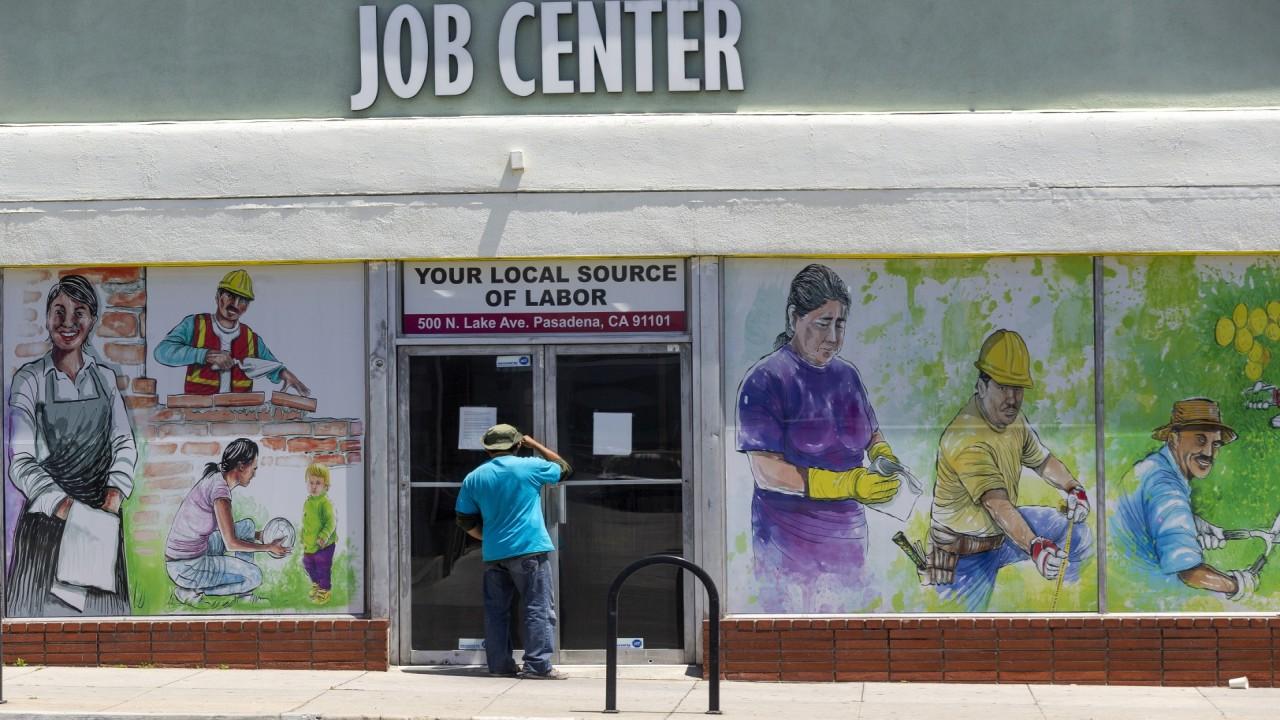US jobs recovery plateaus as coronavirus case surge threatens economy
Recent figures illustrate that applications for jobless benefits fell just 3 percent in the past two weeks, a much slower pace than in April and May
The number of unemployed Americans filing for jobless benefits dropped almost imperceptibly last week, igniting concerns that the labor market’s recovery from the coronavirus pandemic is already starting to plateau.
CORONAVIRUS STILL KEEP NEARLY 140,000 BUSINESSES CLOSED, REPORT SHOWS
On Thursday, the government reported the number of individuals seeking unemployment benefits declined slightly to 1.48 million, pushing the total job losses since the pandemic began in mid-March to around 47 million. An additional 728,120 people applied through a program for self-employed and gig workers. Economists expected the claims to drop to 1.3 million.
Although it marked the 12th straight week that claims dropped, the numbers remain at historically high levels, even as every U.S. state begins to gradually reopen. It's the 14th week in a row that jobless claims came in above 1 million; before the pandemic, the record high was 695,000 set in 1982.
“No matter which way you look at it, over a million unemployed is a very bad thing,” said Mike Loewengart, managing director of investment strategy at E-Trade.
EXTRA $600 IN UNEMPLOYMENT BENEFITS ENDS NEXT MONTH AS MILLIONS OF AMERICANS REMAIN OUT OF WORK
Combined, those figures illustrate that applications for jobless benefits fell just 3 percent in the past two weeks, a much slower pace than in April and May, according to an Associated Press analysis of the data.
“I’m with everybody else, confused,” Jane Oates, the president of WorkingNation and a former employment and training expert in the Labor Department, told FOX Business. “I can’t comprehend why things aren't going back faster. Of course, until this week, half the country was reopened. I think I expected lots more people being called back. I’ve been scratching my head about it, to be honest.”
According to Oates, there are two primary reasons for the lackluster bounceback in the jobs market: First, Americans may be afraid to return to work, particularly in jobs where they’re dealing with customers in-person and are unsure what protections from the virus will look like.
The second reason, she said, is consumer behavior.
WHAT HAPPENS TO YOUR UNEMPLOYMENT BENEFITS IF YOU REFUSE TO GO BACK TO WORK?
“I think a lot of employers aren’t calling people back for certain jobs because they’re not sure what consumer behavior is going to be,” she said. “Of course that impacts hospitality, restaurants, retail, travel. But it’s also impacting other things now, even in manufacturing.”
In April, the personal savings rate in the country surged to 33 percent, according to the Commerce Department’s Bureau of Economic Analysis. If Americans continue to prepare for “what could come next,” and are not spending money, not buying goods, not going on vacation, that could slow down the recovery, Oates said.
Evidence that the labor market's recovery is beginning to stall coincided with a resurgence of COVID-19 cases in some states this week. On Thursday, the nation set a record high of nearly 40,000 new cases. Alabama, Texas, Idaho and Nevada were among the states that notched their own peak in cases. If the outbreak of the virus intensifies, forcing businesses to shut down again, economists have warned the consequences could be dire.
WHITE HOUSE MULLS MORE VIRUS RELIEF: HERE'S WHAT IT COULD INCLUDE
“I think a second wave would really undermine public confidence and might make for a significantly longer recovery and weaker recovery,” Federal Reserve Chairman Jerome Powell said at the end of May.
Disney postponed the scheduled July reopening of its California parks, Apple re-closed 32 stores in five states, and Macy's announced that it would cut 3,900 corporate jobs -- roughly 3 percent of its total workforce. Texas Gov. Greg Abbott hit pause Thursday on the state's reopening plans, and on Friday, he ordered all bars in the state to close and scaled back restaurant capacity by 50 percent.
Data on small businesses also indicates the job market’s improvement cooled in June compared with May, when the economy unexpectedly added 2.5 million positions. Roughly 78 percent of small businesses have reopened as states eased stay-at-home mandates, according to data from Homebase, a scheduling firm.
GET FOX BUSINESS ON THE GO BY CLICKING HERE




















